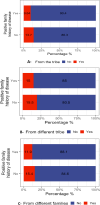The perception of genetic diseases and premarital screening tests in the central region of Saudi Arabia
- PMID: 38858722
- PMCID: PMC11165879
- DOI: 10.1186/s12889-024-19029-0
The perception of genetic diseases and premarital screening tests in the central region of Saudi Arabia
Abstract
The prevalence of consanguineous marriages (CMs) varies worldwide from one country to another. However, the Middle East stands out as a region with a notably high rate of CMs. CM is particularly widespread in Saudi Arabia, where the prevalence of autosomal recessive genetic diseases has increased. This study aims to identify the Saudi population's awareness of genetic diseases and premarital screening tests (PMSTs). It also seeks to understand couples' perceptions of genetic diseases before and after marriage and their attitudes towards PMSTs and genetic counselling (GC) in reducing the risk of CM. Through the administration of online questionnaires, this cross-sectional study surveyed 2,057 participants to assess their awareness of genetic diseases and their understanding of testing and preventive measures for inherited diseases. Descriptive analysis, nonparametric chi-square tests and logistic regressions were performed to assess the association of categorical responses. This study included 2,035 Saudi Arabian respondents. A significant correlation was found between positive family history and partner selection (p = 0.001), as well as between partnering within the same tribe (p = 0.000139), with a different tribe (p = 0.000138) and from another family (p = 0.000489). About 91.3% of participants expressed agreement regarding the need to enhance public awareness and knowledge concerning genetic disorders, while 87% agreed that increased government regulations are required to prevent the spread of genetic diseases in affected families. Despite increased awareness of genetic diseases and PMSTs, there appears to be a lack of understanding regarding the limitations of PMSTs. The persistently high rate of CM underscores the challenge of altering marriage customs. Further governmental efforts are required to promote awareness of alternative reproductive options, establish new regulations and expand screening programmes.
Keywords: Genetic diseases; Genetics screening; Premarital screening; Saudi Arabia.
© 2024. The Author(s).
Conflict of interest statement
The authors declare no competing interests.
Figures



Similar articles
-
Nationwide survey on awareness of consanguinity and genetic diseases in Saudi Arabia: challenges and potential solutions to reduce the national healthcare burden.Hum Genomics. 2024 Dec 18;18(1):138. doi: 10.1186/s40246-024-00700-x. Hum Genomics. 2024. PMID: 39695766 Free PMC article.
-
Health beliefs of unmarried adult Saudi individuals toward safe marriage and the role of premarital screening in avoiding consanguinity: a nationwide cross-sectional study.Front Public Health. 2024 Jun 19;12:1379326. doi: 10.3389/fpubh.2024.1379326. eCollection 2024. Front Public Health. 2024. PMID: 38962764 Free PMC article.
-
Consanguineous marriages, premarital screening, and genetic testing: a survey among Saudi university students.Front Public Health. 2024 Mar 21;12:1328300. doi: 10.3389/fpubh.2024.1328300. eCollection 2024. Front Public Health. 2024. PMID: 38577288 Free PMC article.
-
Strategies for the prevention of hereditary diseases in a highly consanguineous population.Ann Hum Biol. 2005 Mar-Apr;32(2):174-9. doi: 10.1080/03014460500075217. Ann Hum Biol. 2005. PMID: 16096214 Review.
-
Exploring the Effectiveness of Mandatory Premarital Screening and Genetic Counselling Programmes for β-Thalassaemia in the Middle East: A Scoping Review.Public Health Genomics. 2015;18(4):193-203. doi: 10.1159/000430837. Epub 2015 May 29. Public Health Genomics. 2015. PMID: 26045079
Cited by
-
Genetics and Clinical Findings Associated with Early-Onset Myopia and Retinal Detachment in Saudi Arabia.Genes (Basel). 2025 Jul 21;16(7):848. doi: 10.3390/genes16070848. Genes (Basel). 2025. PMID: 40725504 Free PMC article. Review.
-
Healthcare systems and health economics in GCC countries: informing decision-makers from the perspective of the Gulf health economics association.Front Public Health. 2025 Mar 25;13:1510401. doi: 10.3389/fpubh.2025.1510401. eCollection 2025. Front Public Health. 2025. PMID: 40226322 Free PMC article.
-
Public's perception and attitude toward genetic testing in Jazan region.J Family Med Prim Care. 2024 Oct;13(10):4715-4720. doi: 10.4103/jfmpc.jfmpc_872_24. Epub 2024 Oct 18. J Family Med Prim Care. 2024. PMID: 39629431 Free PMC article.
-
Knowledge and Attitude Toward Hemoglobinopathy Premarital Screening Program Among Students of Health Colleges at Qassim University.Cureus. 2025 Jan 7;17(1):e77081. doi: 10.7759/cureus.77081. eCollection 2025 Jan. Cureus. 2025. PMID: 39917116 Free PMC article.
-
Nationwide survey on awareness of consanguinity and genetic diseases in Saudi Arabia: challenges and potential solutions to reduce the national healthcare burden.Hum Genomics. 2024 Dec 18;18(1):138. doi: 10.1186/s40246-024-00700-x. Hum Genomics. 2024. PMID: 39695766 Free PMC article.
References
-
- Christianson A, Howson CP, Modell B. March of Dimes releases premature birth report card: Kentucky receives “F’’’–KMA joins healthy babies coalition”. J Ky Med Assoc. 2008;106(12):557–8. - PubMed
-
- Modell B, Darlison M, Moorthie S, Blencowe H, Petrou M, Lawn J. Epidemiological Methods in Community Genetics and the Modell Global Database of Congenital Disorders (MGDb). 2016. p. 125. [Online]. Available: https://discovery.ucl.ac.uk/id/eprint/1532179/. In Press.
-
- Child EWE. Coming of age in a time of transition. 2017.
-
- Alfares A, et al. A multicenter clinical exome study in unselected cohorts from a consanguineous population of Saudi Arabia demonstrated a high diagnostic yield. Mol Genet Metab. 2017;121(2)91–5. 10.1016/j.ymgme.2017.04.002. - PubMed
MeSH terms
LinkOut - more resources
Full Text Sources
Medical
Miscellaneous

